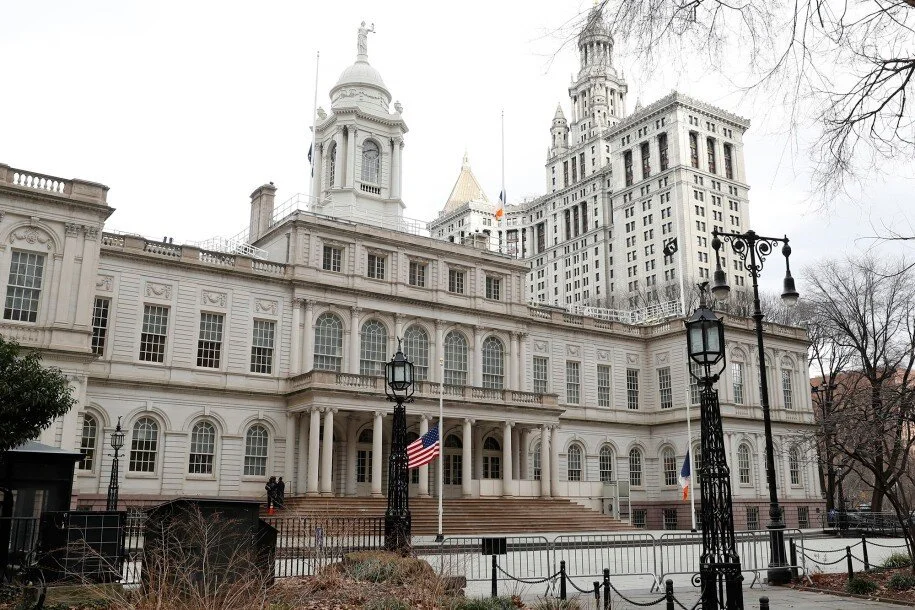'The Nation's Second Hardest Job': An Early Look at the NYC Mayor Race
The New York City Mayor’s Office, pictured above, will be vacated by current Mayor Bill de Blasio at the end of this year. The race to replace him is already heating up with a broad pool of contenders. Source.
The New York City mayorship has often been referred to as the nation’s “second hardest job,” a phrase coined during the days of Fiorello La Guardia’s reign in the late 1930s and early 1940s. Whether or not this assessment is fair, it is undeniable that the mayor of New York wields enormous power and political influence as he (no woman has served as Mayor yet, unfortunately) oversees a nearly $100 billion budget, hundreds of thousands of employees, the largest public school system in the country, and a city of nearly ten million citizens. In addition, the current - and future - mayor faces an extra set of problems as a result of the COVID-19 pandemic, such as budget shortfalls, increased violence, and economic inequity.
Despite all of this, over 40 people filed paperwork to vye for the chance to take over Bill de Blasio’s job when his term concludes at the end of 2021. However, with the June 22 primaries looming a few short months away, only a few candidates have emerged as serious contenders. A recent poll shows three men in the lead - Andrew Yang soared above the masses with 28% support from Democratic voters, while Eric Adams and Scott Stringer tailed with 17% and 15% of the votes, respectively.
So who are these men who have captured the support of liberal New Yorkers and what does their potential election mean not only for the city, but for the nation at large?
The forerunner Andrew Yang is an entrepreneur, best known for his run for the Presidency during the 2020 Democratic primary and for his ardent support of a Universal Basic Income. Though he has no experience in elected office, his name (and hashtag) recognition, significant fundraising potential, and strong anti-poverty position have granted him an edge in the race. Though it seems doubtful Yang would be able to implement a New York UBI as mayor, he’s come out strong on a number of other issues that could radically alter the city’s socioeconomic landscape, including the decriminalization of sex work and wresting the city’s transit system from of the hands of the state government.
Next in line is Brooklyn borough president Eric Adams, who transitioned into politics after spending 22 years in the NYPD. Rather than costing him supporters, however, his ties to the police may be an asset. While an officer, Adams co-founded 100 Blacks in Law Enforcement Who Care, a group aimed at addressing police brutality from inside the force. In fact, his passion for law enforcement reform may stem from the fact that he was beaten by cops when he was only 15. As a politician, Adams is well known for his support of immigrant communities and his extremely pro-development stance, the latter of which may be an unpopular position in the wake of recent controversial building developments in the city like the Hudson Yards.
The last serious contender is City Comptroller Scott Stringer, a career politician whose image as an well-established moderate progressive may allow him to swing votes from both ends of the Democratic party. His experience and policy proposals appeal to both those looking for a time-tested candidate as well as to left-leaning voters attracted by his advocacy on issues such as affordable housing, women’s reproductive rights, LGBTQ rights, and campaign-finance reform.
Other early promising candidates included Shaun Donovan, the former United States Secretary of Housing and Urban Development under President Obama, and Maya Wiley, a professor at the New School and a social justice activist, though recent polls show the two candidates performing significantly worse than their aforementioned peers.
No matter who wins, the new mayor will need to contend with some of the worst crises New York City has seen in decades. Still, issues like climate change, transit, and even public health pale in comparison to the ongoing socioeconomic consequences of COVID-19. Skyrocketing unemployment and homelessness will demand rapid, effective policy solutions. If the next mayor is able to tackle them with any degree of success, New York City could stand as a model for not only the rest of the country, but potentially the rest of the world. Whether it’s Yang’s thousand dollar grants, Adam’s push for affordable housing, or Stringer’s transformative transit plan, the 110th mayor of New York might provide a blueprint for national progressive change…or find himself responsible for an even starker downturn.

